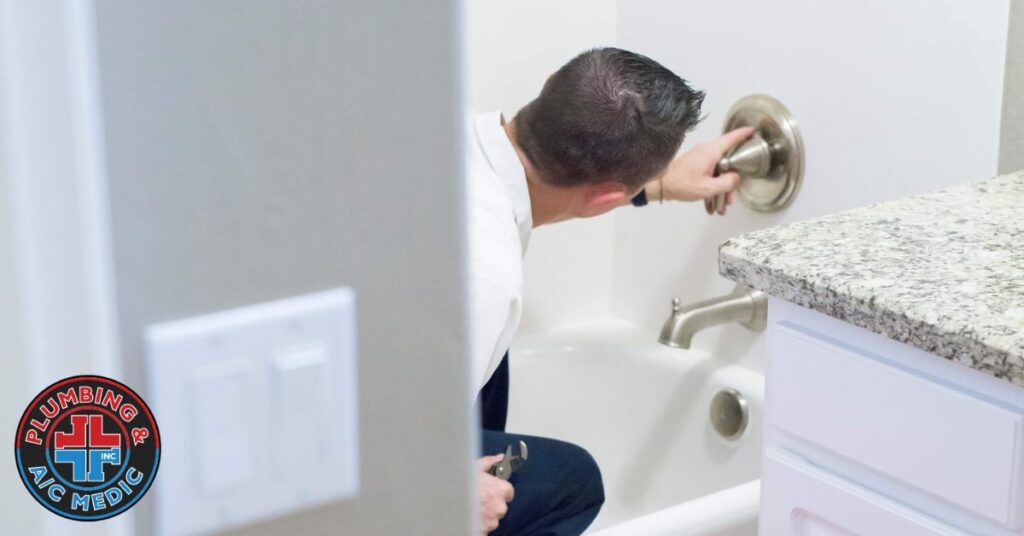What are your thoughts about 11 Must-Read Tips for Plumbing a New House?

For brand-new property owners, understanding and maintaining shower room plumbing can conserve both time and money by stopping costly issues down the line. Below are some crucial shower room pipes tips to aid you keep every little thing running smoothly.
Familiarize Yourself with the Key Shut-Off Shutoff
Knowing where the primary water shut-off valve is located in your house is critical. This allows you to promptly switch off the supply of water in case of major leakages or throughout pipes emergency situations, preventing comprehensive water damage.
Regularly Check for Leakages
Small leaks can result in big problems. Regularly examine under sinks, around bathrooms, and near plumbing components for any type of indications of leakages. Search for dampness, tiny drips, or rust. Capturing and repairing leaks early can stop much more significant damage and conserve water.
Do Not Overlook Slow Drains Pipes
If your sink or bath tub is draining slowly, it's often an indication of a blockage developing. Resolving this early can prevent a full clog. Use a plunger or a plumbing technician's serpent to remove debris. Avoid utilizing chemical drainpipe cleansers as they can harm your pipelines over time.
Know What Not to Flush
Toilets are not garbage disposals. Avoid flushing anything apart from toilet paper and human waste. Things like wipes, womanly health products, and cotton swabs should be thrown away in the garbage to stop blockages and sewer backups.
Mount Strainers in Drains
Location strainers in your sink and bath tub drains to capture hair and various other debris prior to they enter your pipes system. Cleaning the filters consistently will help stop buildup and maintain water flowing openly.
Maintain Your Water Heater
Guarantee your hot water heater is readied to a suitable temperature level (usually about 120 degrees Fahrenheit) to avoid scalding and reduce power usage. Flush the container each year to eliminate debris buildup, which can reduce the effectiveness and lifespan of your heating system.
Upgrade Your Components
If your home has older components, consider updating to more reliable models. Modern toilets, showerheads, and faucets are created to make use of much less water while giving great pressure, which can considerably reduce your water costs and ecological impact.
Beware with Do It Yourself Plumbing Repairs
While it's appealing to handle all home repair work on your own, beware with pipes. Some issues might require expert know-how, specifically if they involve major water lines or sewage system fixings. Working with a specialist can in some cases be a lot more affordable than do it yourself, particularly if it protects against more damage.
Plan For Winter
Protect your pipelines from freezing throughout winter by shielding pipelines in unheated areas like basements, attics, and garages. During extreme chilly, allow cold water drip from taps served by exposed pipes to assist stop cold.
Set Up Regular Upkeep
Consider organizing yearly inspections with a certified plumbing professional. They can identify problems that you may miss, such as concealed leakages or wear and tear on pipelines and fixtures. Normal maintenance aids extend the life of your plumbing system and can stop emergencies.
Conclusion
Comprehending and maintaining your home's shower room plumbing can protect against lots of common concerns. By following these vital pointers, you can guarantee your washroom remains practical and efficient, saving you money and time in the long run.
Essential Plumbing Tips for Homeowners: Keep Your Pipes Flowing Smoothly
As a homeowner, understanding the basics of your plumbing system can save you time, money, and a lot of headaches. Plumbing issues can range from minor annoyances like dripping faucets to major problems like burst pipes that cause significant damage. This guide provides essential tips to help you maintain your plumbing system and tackle common issues.
Understanding Your Plumbing System
Supply System: Brings fresh water into your home from a municipal source or a well. Drain-Waste-Vent System: Removes wastewater and vents sewer gases outside. Fixtures and Appliances: Includes sinks, toilets, showers, dishwashers, and washing machines. Basic Maintenance Tips
Regular Inspections: Periodically check for leaks, corrosion, and other signs of wear and tear. Look under sinks, around toilets, and near water heaters. Know Your Main Shut-Off Valve: In case of a major leak, you’ll need to shut off the water quickly. Ensure everyone in your household knows where the main shut-off valve is located. Prevent Frozen Pipes: In cold climates, insulate exposed pipes and let faucets drip during extreme cold to prevent freezing. Use Strainers: Install strainers in sinks and tubs to catch hair, food particles, and other debris that can cause clogs. Common Plumbing Issues and Solutions
Clogged Drains:
Prevention: Avoid pouring grease down the drain and use drain screens to catch debris. DIY Fix: Use a plunger or a plumbing snake to clear minor clogs. For stubborn clogs, a mixture of baking soda and vinegar can sometimes help. Leaky Faucets:
Prevention: Replace washers and seals regularly. DIY Fix: Turn off the water supply, disassemble the faucet, and replace worn parts.

Click Here